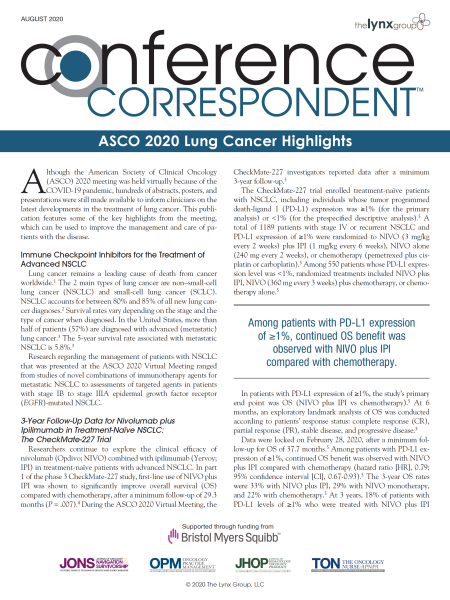
News, views, and coverage of important topics and discussions from oncology conferences and events.
[widgetkit id="2" name="CC Highlights"]For patients with non-germline BRCA-mutated platinum-sensitive relapsed ovarian cancer, the triple combination of olaparib, durvalumab, and bevacizumab demonstrated a promising 24-week disease control rate and safety profile while the combination of olaparib plus durvalumab did not meet the prespecified efficacy target.
The VIRO-15 trial of intraperitoneal Olvi-Vec virus infusion followed by intravenous carboplatin-doublet ± bevacizumab in pretreated platinum-resistant/refractory ovarian cancer patients revealed promising response rates and progression-free survival. Safety results were consistent with a previous phase 1b trial of this agent.
In patients with advanced ovarian cancer, niraparib resulted in similar efficacy, safety, and quality-of-life outcomes for patients 65 years of age and those ≥65 years of age. An individualized starting dose resulted in fewer grade ≥3 thrombocytopenia events than a fixed starting dose.
An observational study of hospitalized patients and patients in outpatient treatment facilities being treated with olaparib as maintenance therapy for relapsed BRCA-mutated ovarian cancer following platinum-based chemotherapy reveals preservation of health-related quality of life in interim study results.
A phase 2, randomized study of patients with platinum-resistant relapsed ovarian cancer assessed overall response to olaparib monotherapy compared with standard-of-care chemotherapy. Olaparib was effective in platinum-resistant and platinum-sensitive patients with and without homologous recombination repair (HRR) gene alterations.
The phase 3 ARIEL3 study investigated rucaparib as maintenance therapy in patients with recurrent ovarian cancer. An exploratory safety analysis found time to onset of nonhematologic treatment-emergent adverse events was 1 month, 2 months for anemia, and 3 months for decreased hemoglobin.
In patients with newly diagnosed high-grade serous ovarian cancer, dose-dense weekly paclitaxel was associated with longer progression-free survival and higher frequency of grade 3/4 adverse events, including hematologic toxicities, versus paclitaxel given every 3 weeks.
Although the American Society of Clinical Oncology (ASCO) 2020 meeting was held virtually because of the COVID-19 pandemic, hundreds of abstracts, posters, and presentations were still made available to inform clinicians on the latest developments in the treatment of lung cancer. This publication features some of the key highlights from the meeting, which can be used to improve the management and care of patients with the disease.
Results from the ARROW study show that pralsetinib demonstrates broad and durable antitumor activity across multiple advanced solid tumor types, regardless of RET fusion genotype.
Results from the ARROW study showed that pralsetinib has rapid, potent, and durable clinical activity in patients with advanced RET fusion–positive non–small-cell lung cancer, regardless of RET fusion genotype or prior therapies.

